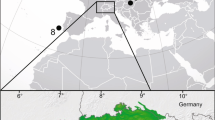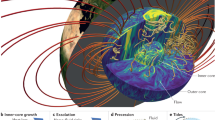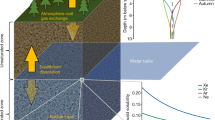Abstract
DR. J. H. J. POOLE has kindly pointed out to me that the reference to the adiabatic gradient of temperature in my previous letter1 is capable of being understood to mean that he believes that the adiabatic gradient in a liquid heated below would not be maintained. This was not intended; the maintenance of the adiabatic gradient by convection currents (or rather, of one exceeding it by the trifling amount needed to start and maintain convection currents) is essential both to his views and mine. My point was simply that excess heat would be carried up by convection currents, as in the formation of cumulus clouds on a summer day, while a passage in his letter had appeared to cast doubt on this.
This is a preview of subscription content, access via your institution
Access options
Subscribe to this journal
Receive 51 print issues and online access
$199.00 per year
only $3.90 per issue
Buy this article
- Purchase on Springer Link
- Instant access to full article PDF
Prices may be subject to local taxes which are calculated during checkout
Similar content being viewed by others
References
NATURE, April 18, p. 595.
Scientific Proceedings of the Royal Dublin Society, vol. 19, No. 32.
"The Earth", p. 222.
NATURE, April 18, p. 593.
Geog. Jour., April 1931.
Author information
Authors and Affiliations
Rights and permissions
About this article
Cite this article
JEFFREYS, H. The Earth's Thermal History. Nature 127, 777–778 (1931). https://doi.org/10.1038/127777b0
Issue Date:
DOI: https://doi.org/10.1038/127777b0
Comments
By submitting a comment you agree to abide by our Terms and Community Guidelines. If you find something abusive or that does not comply with our terms or guidelines please flag it as inappropriate.



